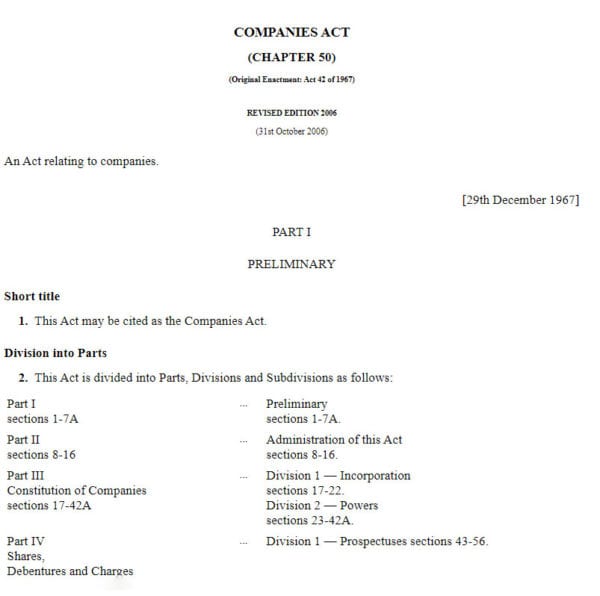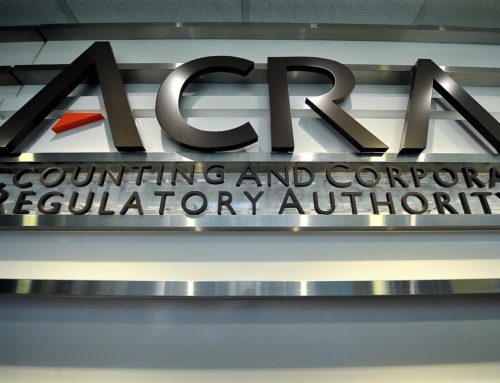Ever since its enactment in 1967, the Singapore Companies Act has been the ultimate legislation pertaining to the incorporation, management, and dissolution of companies in the country. The Act applies to every single business entity in Singapore, whether a public or private limited company, a sole proprietorship or a partnership. The Accounting and Corporate Regulation Authority in Singapore (ACRA) is responsible for ensuring that companies in Singapore align themselves with the provisions laid down in the Act, and penalising companies that are in breach of its regulations.
Key Provisions in the Singapore Companies Act

The Singapore Companies Act covers several key provisions related to the incorporation of new companies, including company name selection, a definition of the various roles and responsibilities of the Company Directors and Secretary, the required registers for a company, KYC (Know-Your-Customer) regulations and much more. Some of the key provisions are discussed in more detail below.
Company name registration
The selection of a name is something that all companies in Singapore must do. The Singapore Companies Act lays down the types of names that are and are not acceptable; for example, it must be unique, should not contain any obscenities, nor be similar to another company. The Act also explains the process for lodging a complaint with ACRA in case a name violation is discovered. The list of registered companies in Singapore, which contains all the business names can be viewed in Bizfile.
Company Directors
Every company requires leadership to guide it and manage its affairs, which is why the Companies Act covers in great detail the roles of the company director. Some of the key requirements for a company director as laid down in the Act are :
- He/she must be above 18 years of age
- One director must be a local of Singapore
- He/she must not have a history of illegal activities
The Companies Act also covers the specific roles of the company director, like the maintenance of company records and accounts, appointment of a company secretary and auditors, issue of shares and dividends, to name a few.
Company meetings
The Companies Act also outlines the procedures related to mandatory meetings to be scheduled by a company, such as the statutory and Annual General Meeting (AGM). Some of the requirements for the AGM are:
- It needs to be hosted within the first 18 months from the incorporation date, and subsequently at a frequency of every year (or not longer than 15 months).
- Appropriate prior notice of 14, 21, or 28 days needs to be provided to members and shareholders depending on the purpose of the meeting (the passing of a special resolution or special notice requirement necessitating a longer notice period).
- A minimum quorum of 2 members is required to transact any business at the meeting.

Recent Amendments to the Singapore Companies Act
The dynamic nature of business in the Lion City has necessitated a number of amendments to the original Companies Act in order to improve the ease of operations and to improve transparency. Some of the key amendments outlined in the most recent amendment in 2017 include:
Changes to controllers and directors:
- The maintenance of a private register of controllers (any person or entity with a considerable stake of more than 25% in the business)
- Disclosure of nominee status and nominators to the company by nominee Directors of a company
- The recognition of one-Director companies in Singapore (with two caveats – that the owner be a local of Singapore, and a separate company Secretary be hired)
Documentation and certification requirements:
- Assets/documents of a dissolved company to be maintained for 5 years instead of 2 years.
- Requirement for struck off companies to maintain their records for 5 years.
- Removed requirement for a company seal.
- Company secretaries are no longer required to be physically present at the registered address.
Debt Restructuring:
- Ability of the Court to grant a 30-day moratorium for companies in financial distress.
- The provision of super priority to creditors offering rescue financing/bailouts to restructuring debtors.
- Disclosure of information by the financially distressed company during the moratorium, in order to prevent the liquidation of assets.
- New insolvency regulations for multinational companies.










Leave A Comment